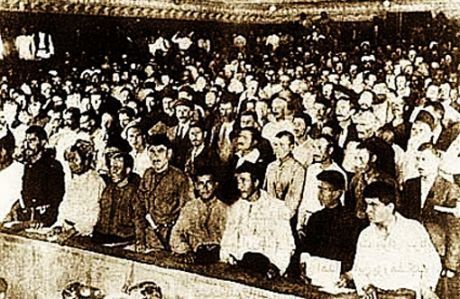Features
You are here
Russian Revolution and the Peoples of the East

March 27, 2017
“Workers of all lands, and oppressed peoples of the whole world, unite!”
This was a historic change to the call of the Communist Manifesto for only “workers of the world” to unite. And it was made in Baku, Azerbaijhan, in 1920.
Russian Bolshevik Zinoviev (later murdered by Stalin) proposed the change in his closing remarks to the First Congress of the Peoples of the East in 1920. He said that it was now possible to broaden the call first made my Marx and Engels in 1848 to include all colonies and countries oppressed by imperialism.
This new call was made possible by a revolution that had just risen up in 1917 against an empire that imprisoned dozens of oppressed nationalities, many of them Muslim.
The revolution against the “prisonhouse of nations” known as Tsarist Russia had happened in the Western part of the empire just as Muslim nations to the East had been roused to rebellion by the imperialist bloodshed of World War One. What happened in the West fed what continued in the East.
What happened in the West of the Russian empire
From October 1917 the Bolsheviks took extensive measures to protect religious freedoms, particularly of ethnic minorities. Muslim workers and farmers were promised that, “henceforth your beliefs and customs, your national and cultural institutions are declared free and inviolable.”
In 1922, Moscow introduced reforms in Central Asia that returned lands confiscated by the Russian State back to the mosques, reopened religious schools, and brought back Islamic courts as a legal alternative to Soviet courts.
In 1923, the Moscow central government authorized “Muslim spiritual schools” in order to encourage Muslim parents to educate their children. At the same time, Russian Muslims became the first in the world to vote to free women from traditional Islamic restrictions. In 1917, the first All-Russian Congress of Muslims voted for equality of political rights for women, and an end to polygamy and forced purdah.
What happened to the East
In 1920, the Congress of the Peoples of the East proposed in its opening rally “a single union of the working people not only of Asia and Europe but of the entire world, so as to put an end to capitalism and begin a new and better life.” By the end, the assembled representatives of diverse Eastern nationalities and religions had sworn to begin a holy war against imperialism and capitalism:
“Comrades, the first two days of our congress were spent discussing what our attitude should be towards the Entente, toward imperialism. That moment when the assembled representatives of the peoples of the East swore to begin a holy war, that moment will be preserved in our hearts as a sacred experience. That was the basis for everything else, that is what unites us all. Yes, a holy war against the plunderers and capitalists!”
The Chair during the closing remarks declared that “the congress we have just held went down in history from the moment when it began and the enslaved, oppressed, exploited peoples of the East assembled here. The bourgeoisie has been afraid that the workers in the West would revolt. And then, just as it was sleeping sweetly on its soft pillow, at that very moment a congress of the oppressed peoples of the East assembles, gets organized, and goes onto the attack with unprecedented, amazing, heart-lifting unanimity.”
Counter-revolution
By the late twenties, the Russian revolution was destroyed in all but name.
The new ruling class that asserted itself under Stalin reintroduced both the persecution of religious freedoms and the chauvinist Tsarist policies of Russification and empire. It also imposed forced collectivization of the peasantry in the Soviet republics of Asia as in the western Soviet republics, and wreaked counterrevolutionary terror against all who tried to defend the revolution.
All the speakers from Asia at the Baku congress who were in reach of Stalin’s purges were killed.
Internationally, the policies of Communist parties toeing the Stalinist line, especially in the West, went over to the nationalist – and ultimately imperialist – ideology of “socialism in one country.”
But the legacy of the Baku Congress lives on, as a real-life story of what workers can do when they take down an empire. It’s not only the empire that falls, but the hatred and racism it tries to sow inside us:
“Let us tear out of our hearts whatever can disunite us. Let us remember we have one enemy – imperialism. Let each of us devote our lives to liberating the peoples of the East and of the world as a whole.”
Register today for the conference One solution, revolution: Marxism 2017, April 21-22 in Toronto, including the discussion “1917-2017: 100 years since the Russian Revolution” with John Riddell and Michelle Robidoux
Section:









